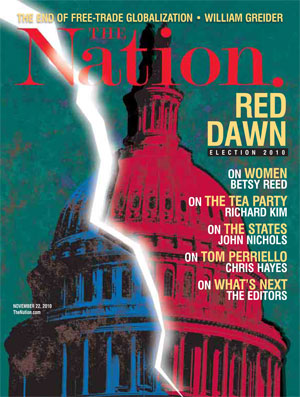Western Promises Western Promises
From the archive: A book by a former ICTY official offers a vivid insider's account of realpolitik at the Milosevic trial.
Dec 20, 2007 / Books & the Arts / Marc Perelman
Snake Oil Market Softening Snake Oil Market Softening
Is that what makes his hair so nice?
Dec 20, 2007 / Column / Calvin Trillin
The Secret Library of Hope The Secret Library of Hope
Twelve authors on war and peace, dissent, the environment and the empowerment of the poor provide inspiration to transform the world in 2008.
Dec 17, 2007 / Books & the Arts / Rebecca Solnit
Memorable Gestures Memorable Gestures
Michael Ondaatje shows off his trademark narrative tricks in his new novel Divisadero, but the magic is wearing thin.
Dec 13, 2007 / Books & the Arts / Tony Eprile
Lippmann and the News Lippmann and the News
In the early 1900s Walter Lippman laid the groundrules for public debate in America. Have the US media followed his prescriptions?
Dec 13, 2007 / Books & the Arts / Michael Schudson
Why I Won’t Be Invited to Mitt Romney’s White House Why I Won’t Be Invited to Mitt Romney’s White House
My top-ten list of reasons why I gave God the old heave-ho.
Dec 12, 2007 / Editorial / Annabelle Gurwitch
George Bush, Upon Hearing That the Iranians Abandoned Their Nuclear Weapons Program in 2003 George Bush, Upon Hearing That the Iranians Abandoned Their Nuclear Weapons Program in 2003
All fired up and nowhere to go.
Dec 12, 2007 / Column / Calvin Trillin
The Madman and the Poet The Madman and the Poet
In a new collection of poems by the mentally ill Czech dissident Ivan Blatný, the world and the poet's interpretations of it are continuously transforming.
Dec 6, 2007 / Books & the Arts / Benjamin Paloff
A Kind of Waiting Always A Kind of Waiting Always
A new book of Rod Smith's poems maps the geometry of social life in thoughts and phrases.
Dec 6, 2007 / Books & the Arts / Joshua Clover
The Old and New Shapes of Nuclear Danger The Old and New Shapes of Nuclear Danger
During the cold war, the driving force was the bilateral arms race; now it's proliferation.
Dec 6, 2007 / Feature / Jonathan Schell
